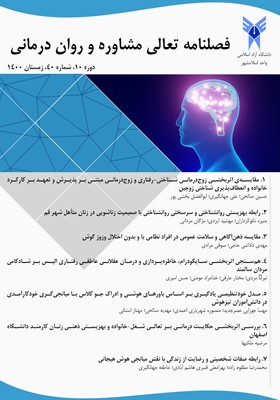مقایسهی اثربخشی زوجدرمانی شناختی-رفتاری و زوجدرمانی مبتنی بر پذیرش و تعهد بر کارکرد خانواده و انعطافپذیری شناختی زوجین
محورهای موضوعی : فصلنامه تعالی مشاوره و روان درمانی
حسین صالحی
1
![]() ,
علی جهانگیری
2
*
,
علی جهانگیری
2
*
![]() ,
ابوالفضل بخشی پور
3
,
ابوالفضل بخشی پور
3
![]()
1 - دانشجوی دکترای مشاوره، گروه روانشناسی، واحد بجنورد، دانشگاه آزاداسلامی، بجنورد، ایران
2 - استادیار، گروه روانشناسی و مشاوره، دانشگاه پیام نور، تهران، ایران
3 - استادیار، گروه روانشناسی، واحد بجنورد، دانشگاه آزاداسلامی، بجنورد، ایران
کلید واژه: کارکرد خانواده, انعطاف پذیری شناختی, زوج درمانی پذیرش و تعهد, زوج درمانی شناختی-رفتاری,
چکیده مقاله :
هدف: سیر صعودی آمار طلاق و وجود تعارضات و آشفتگیهای روابط زوجین انگیزه محققان برای یافتن روشهای مداخلهای مقرون به صرفه جهت کاهش مشکلات زوجین را افزایش داده است. این پژوهش با هدف مقایسه اثربخشی زوجدرمانی شناختی-رفتاری و زوجدرمانی پذیرش و تعهد بر کارکرد خانواده و انعطافپذیری شناختی زوجین انجام شد.روش: این پژوهش، نیمهآزمایشی با پیشآزمون، پسآزمون و پیگیری دوماهه با گروه گواه بود. جامعه آماری شامل تمامی زوجین مراجعهکننده به مرکز مشاوره مهرسای شهر آشخانه در سال 1398 بودند، که از بین آنها تعداد 60 نفر با روش در دسترس انتخاب و در سه گروه مساوی گمارش شدند. مداخلات درمانی برای هر یک از رویکرهای زوجدرمانی طی 12 جلسه، 1 جلسه در هفته و هر جلسه 90 دقیقه اعمال شد، اما گروه گواه مداخله درمانی دریافت نکرد. برای گردآوری دادهها از چکلیست اطلاعات دموگرافیک، مقیاس عملکرد خانواده (اپشتاین و همکاران، 1983) و مقیاس انعطافپذیری شناختی (دنیس و وندروال، 2010) استفاده شد. دادهها با روشهای آمار توصیفی و تحلیل واریانس با اندازهگیریهای مکرر با نرمافزار آماری SPSS-26 تحلیل شد.یافتهها: در ترکیب خطی متغیرهای کارکرد خانواده و ابعاد آن (حل مسأله، ارتباطات، نقشها، همراهی و پاسخگویی عاطفی و کنترل رفتار) برحسب عضویت گروهی اثر تعاملی گروه و زمان معنادار بود (001/0=P). تفاوت میانگین نمره گروه زوجدرمانی پذیرش و تعهد و زوجدرمانی شناختی-رفتاری با گروه گواه در انعطافپذیری شناختی معنادار بود (009/0=P). زوجدرمانی شناختی-رفتاری در مقایسه با زوجدرمانی پذیرش و تعهد بر کارکرد خانواده زوجین تأثیر بیشتری داشت (001/0=P)، اما بین روشهای مداخله بر انعطافپذیری شناختی تفاوت معناداری وجود نداشت (092/0=P).نتیجهگیری: نتایج نشاندهنده اهمیت هر دو روش بر کارکرد خانواده و انعطافپذیری شناختی زوجین بود. بنابراین، مشاوران و درمانگران میتوانند از روشهای مذکور بهویژه زوجدرمانی شناختی-رفتاری برای مداخله در بهداشت روانی زوجین استفاده نمایند.
Purpose: The rising trend of divorce statistics and the existence of turmoil in couples relationships has increased the motivation of researchers to find less costly intervention methods to reduce couples problems. The aim of this study was to comparing the effectiveness of cognitive-behavioral couple therapy and acceptance and commitment couple therapy on family function and cognitive flexibility of couples.Methodology: This study was a quasi-experimental with pre-test, post-test and two-months follow-up with a control group. The statistical population included all couples who referred to mehrsai counseling center in Ashkhaneh during 2019, among them, 60 people were selected by the available method and assigned to three equal groups. Therapeutic interventions were applied for each of the two couples therapy approaches in 12 sessions, 1 session per week and 90 minutes per session, But the control group did not receive any medical intervention. Demographic information checklist, family assessment device (Epstein& et al, 1983) and cognitive flexibility inventory (Dennis& VanderWal, 2010) were used to collect data. Data were analyzed by descriptive statistics and analysis of variance with repeated measures using SPSS-26 statistical software.Findings: There was a significant difference in the linear composition of the Family Function and its dimensions include the tendency to (problem solving, communication, roles, involvement and affective responsiveness and behavior control) to difficult situations in terms of group membership, and the interactive effect of the group and time (P=0.001). Besides, the two treatment groups (acceptance and commitment, cognitive-behavioral couple therapy) showed significant differences with the control group in terms of the components of psychological flexibility and its dimensions (P=0.009). Cognitive-behavioral couple therapy has a greater effect on the functioning of couples' families than acceptance and commitment couple therapy (P=0.001), but there was no significant difference between the intervention methods on cognitive flexibility (P=0.092).Conclusion: The results showed the importance of both methods on family functioning and cognitive flexibility of couples. Therefore, counselors and therapists can use these methods, especially cognitive-behavioral couple therapy to intervene in the mental health of couples.
_||_

